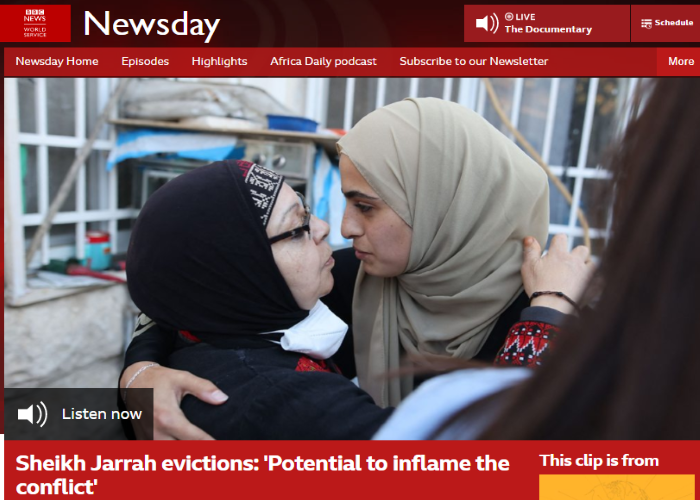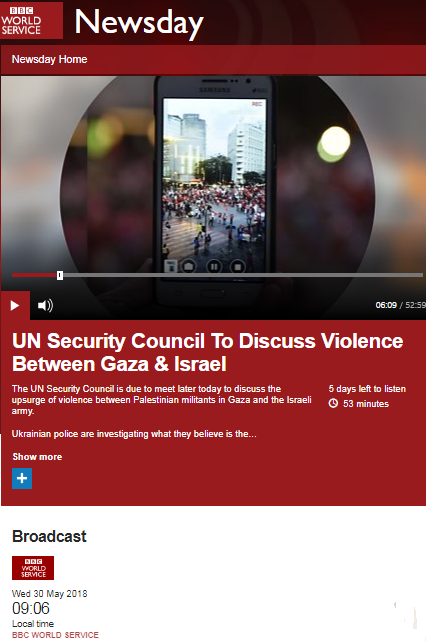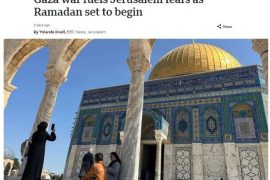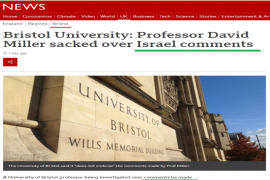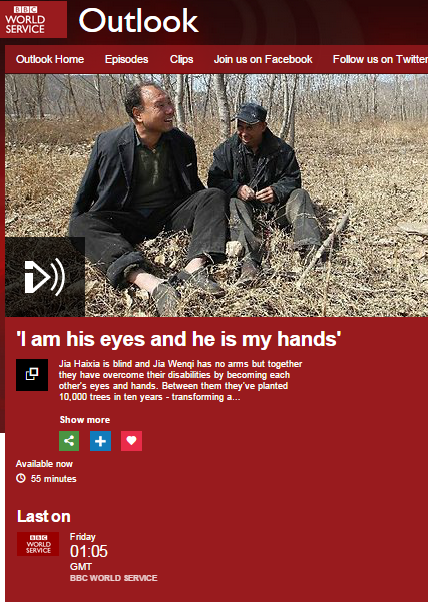In part one of this post we discussed the BBC’s use of partisan terminology and its predominant amplification of content and comment supplied by campaigning organisations and individuals reflecting one side of opinion concerning the Sheikh Jarrah property dispute in two written reports. The same story was the topic of several items aired on BBC radio programmes on the same day, August 2nd.
Like the BBC News website, BBC Radio 4’s ‘Today’ programme promoted some early morning pre-emptive framing of the story (from 38:29 here) with presenter Sarah Smith employing partial terminology to introduce the story. [emphasis in italics in the original, emphasis in bold added]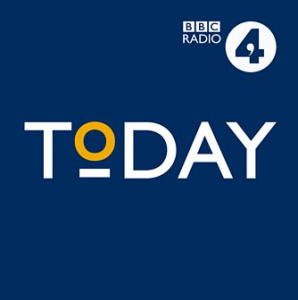
Smith: “Israel’s Supreme Court is due to make a decision on whether to evict Palestinian residents in a neighbourhood of occupied East Jerusalem today.”
Listeners heard from the BBC Jerusalem bureau’s Tom Bateman who gave background that included the following:
Bateman: “…a Jewish settler group has been attempting to take over many homes really over the last three to four decades. Now they claim historic rights to the land which was owned by Jewish trusts in the 19th century. These homes were built after the war surrounding Israel’s creation in 1948 when Palestinians…ahm…fled or were forced from their homes. Many of those ended up in this srea of Sheikh Jarrah. The homes were built for them. They’ve been there ever since so you have generations of people who’ve been born there.”
Those “historic rights to the land” are of course not just a “claim”: they were recognised by the court many years ago and the fact that Jordan classed the land as “enemy property” supports that.
Smith and Bateman also tried to frame the story as being connected to the Israeli government rather than a legal issue brought by private parties to courts which are independent from the government.
Smith: “And because there is so much tension around this, presumably there is significant diplomatic pressure on the government.”
Bateman: “There’s been lots […] and there has been diplomatic pressure, most notably the Americans have had things to say about this. There was a detailed statement earlier this year where they called for respect for the families of Sheikh Jarrah. That was quite notable.”
Three episodes of the BBC World Service radio programme ‘Newsday’ aired on August 2nd also included items relating to the court hearing that had yet to take place.
“The high court in Israel is expected to rule on a controversial plan to evict some Palestinian families from a neighbourhood in East Jerusalem.”
“Israel’s Supreme court is expected to rule on the controversial eviction of Palestinian families from a neighbourhood in East Jerusalem.”
“In the next few hours the Supreme Court in Israel is expected to rule on a controversial plan to evict Palestinian families from a neighbourhood in East Jerusalem.”
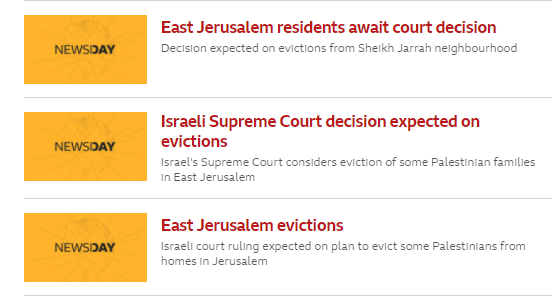
For reasons unknown, none of those episodes are currently available but the BBC World Service did promote a version of one of those items on Twitter using a picture of activist Muna el Kurd.
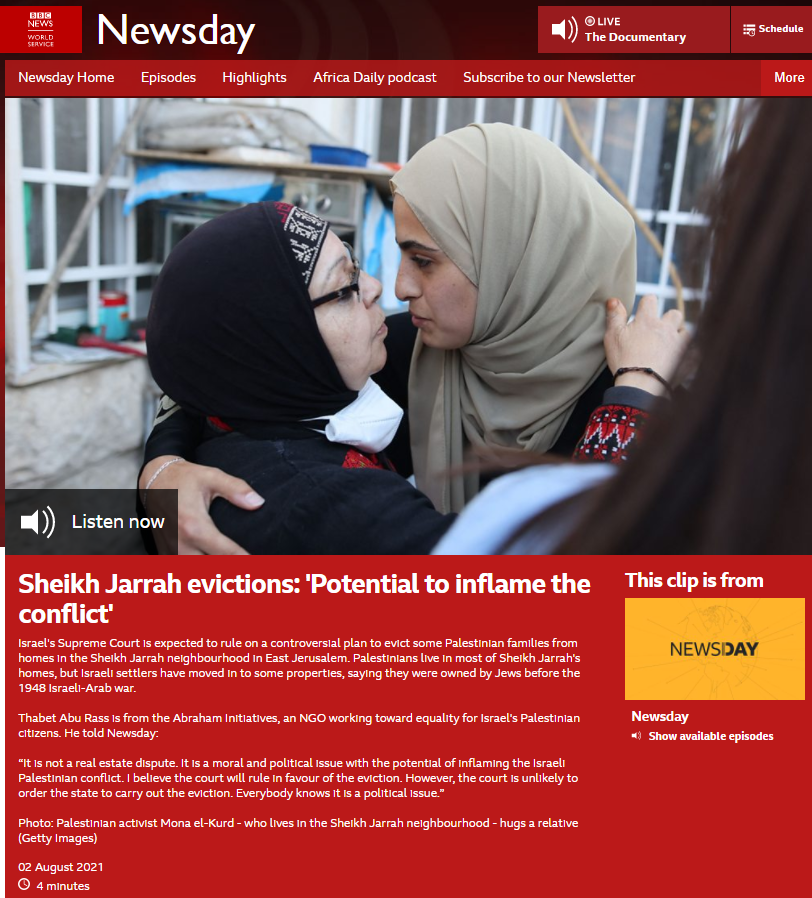
“Israel’s Supreme Court is expected to rule on a controversial plan to evict some Palestinian families from homes in the Sheikh Jarrah neighbourhood in East Jerusalem. Palestinians live in most of Sheikh Jarrah’s homes, but Israeli settlers have moved in to some properties, saying they were owned by Jews before the 1948 Israeli-Arab war.
Thabet Abu Rass is from the Abraham Initiatives, an NGO working toward equality for Israel’s Palestinian citizens. He told Newsday:
“It is not a real estate dispute. It is a moral and political issue with the potential of inflaming the Israeli Palestinian conflict. I believe the court will rule in favour of the eviction. However, the court is unlikely to order the state to carry out the eviction. Everybody knows it is a political issue.””
Prior to his latest position, Thabet Abu Rass was involved with a variety of political NGOs from one side of the political spectrum including Adalah.
Abu Rass also promoted the PR narrative that the story is connected to the Israeli government rather than a legal issue brought by private parties to the courts.
Abu Rass: “It is not a real estate dispute as some Israelis claim and this eviction, our eviction for non-payment of rent and the Palestinians are squatters, actually it’s a…it’s a moral and political issue with potential of inflaming Palestinian-Israel conflict. Let us remember that the international community including the Biden administration opposing such evictions. The battle it’s not really between Palestinians and some Jewish settlers but rather between the Palestinians and the government of Israel.”
Later on Abu Rass again claimed that “everybody knows that it’s a political issue” and inaccurately asserted that the relevant houses in Sheikh Jarrah were “built on land that a property for the Jordanians” without any challenge from the BBC presenter (apparently Lawrence Pollard). Neither did his reference to Israel as “historical Palestine” solicit any questioning from his host.
Listeners to the BBC World Service radio programme ‘Newshour’ on August 2nd heard items relating to the same story in both editions.
The “top story” in the afternoon edition (presented by Razia Iqbal from 1:04 here) was described as follows in the synopsis:
“An Israeli court decides the fate of Palestinians facing eviction in East Jerusalem in a case which has become the focus of international attention. The long-awaited hearing concerns four of more than 70 families appealing against an order to leave their homes in Sheikh Jarrah neighbourhood.”
Razia Iqbal’s initial presentations of the topic once again used politically partial terminology.
Iqbal: “In a moment we will be in Israel where the Supreme Court is due to rule on the eviction of Palestinians from their homes in occupied East Jerusalem.”
Iqbal: “We begin today though in Jerusalem and specifically the neighbourhood of Shekh Jarrah in occupied East Jerusalem.”
Iqbal went on to erase Hamas’ opportunistic incitement around the topics of a decades-old property dispute and an Israeli holiday along with its launching of missiles at Israel’s capital:
Iqbal: “It was the tension surrounding the imminent eviction of Palestinian families from that area that was a catalyst for the conflict between Israel and Hamas in May.”
She also failed to inform listeners that the issue of the ownership of the land was decided by the court years ago.
Iqbal: “The families are appealing against a lower court ruling in favour of Jewish settlers who claim old rights to the land and they seek to evict the Palestinians.”
Most of the item was given over to an interview with Suhad Bishara of the foreign funded political NGO Adalah who was introduced by Iqbal as follows:
Iqbal: “…Suhad Bishara, a senior lawyer and director of the land and planning rights unit at Adalah. It means justice in Arabic. It’s an independent human rights organisation and legal centre.”
Iqbal began by asking Bishara to “outline for us from the Palestinian perspective what has been the issue”. Her guest did precisely that, including making the claim that the families were “supposed to be registered as owners of the properties….according to agreements with the Jordanian government” (which listeners were not told was at the time occupying the territory illegally) but that the failure to complete that legal process in the years between “the (19)50s” and 1967 was because of “the Israeli occupation” and “the illegal annexation of East Jerusalem”.
Iqbal provided her guest with the cue for yet more framing of the story as being connected to the Israeli government.
Iqbal: “But what we’re looking at today is nearly 30 years of legal proceedings which the Israelis say is not a matter for the state but a private property dispute.”
The same day’s evening edition of ‘Newshour’ – presented by Tim Franks – also included an item (from 45:03 here) on the same story from the same perspective which was introduced using the same politically partisan terminology.
Franks: “Israel’s Supreme Court has proposed a plan to enable Palestinians threatened with eviction from their homes in occupied East Jerusalem to stay where they are.”
Like Iqbal, Franks also gave a partial portrayal of the causes of hostilities in May which erases Hamas’ role from audience view.
Franks: “The long-standing dispute has fuelled Israeli-Palestinian tensions in recent months, culminating in the conflict between the Israeli military and militants in Gaza.”
Franks’ sole interviewee in this item was Sami Irshaid – the lawyer representing the four Palestinian families from Sheikh Jarrah.
Franks also ignored the findings of previous court proceedings concerning ownership of the land, describing the case as a “principled dispute which obviously the families on one side feel that they rightfully own these homes that they’ve lived in for generations and that the settler organisation is saying otherwise”.
Irshaid promoted the narrative that the story is connected to the Israeli government, claiming that the offer of protected tenancy proposed by the court was because it is “not convenient timing for the State of Israel to rule in this case”.
Another BBC World Service radio programme that included items on the Sheikh Jarrah story on August 2nd was BBC OS, presented by James Reynolds. One edition of that programme had an item (from 04:08 here) introduced as follows:
Reynolds: “Let’s go to Israel now where the Supreme Court has been holding a session to consider the possible eviction of Palestinian residents from a neighbourhood of occupied East Jerusalem.”
Listeners heard a recording of Tom Bateman reporting from the courthouse for another BBC programme in which he promoted messaging also seen in written reports on the topic, stating that the UN human rights office regards the potential eviction of residents who have refused to pay rent for years as “forced transfer that may amount in their view to a war crime”.
Reynolds then brought in Issam Ikirmawi of BBC Arabic “who has been speaking to some of the Palestinian families involved in the case”.
Ikirmawi promoted talking points from that side of the story, telling listeners that Palestinians “see the Israeli court as a tool or a device of the Israeli system which is trying to assist the settlers to take over Palestinian property” and amplifying portrayal of the Jewish ownership of the land in question as an ‘outrageous claim’.
Listeners heard no alternative opinions and no facts which would help them put those statements into their correct perspective.
The next hour of the same programme included an item (from 00:14 here) on the same topic which was introduced by Reynolds using the same politicised terminology as before.
Reynolds: “Let’s go to Israel now where the Supreme Court has been holding a session to consider the possible eviction of Palestinian residents from a neighbourhood of occupied East Jerusalem.”
Listeners again heard from Tom Bateman, who gave a misleading portrayal of Sheikh Jarrah as “a really old neighbourhood. It’s been there for many, many hundreds of years”. Having correctly stated that the neighbourhood is the site of “a Jewish shrine that’s been there for many centuries” and “around that shrine land was bought by two Jewish religious trusts in the 19th century”, Bateman went on to amplify the simplistic narrative of campaigners:
Bateman: “…but it is in occupied East Jerusalem so as far as the Palestinians are concerned this is occupied territory and they, under international convention, should have the protection of international law which…err…one of the reasons they don’t recognise Israeli court system. Their lawyer told me that as far as they were concerned, they went into all of this with the system skewed against them”.
Decades of court hearings culminating in an effort by the Supreme Court to reach a compromise that would see the Palestinian families remain in their homes of course hardly support that claim of bias.
Of those eight items of content aired on two BBC radio stations on August 2nd, two included interviews with representatives of inadequately presented NGOs from one side of the political map and one featured the lawyer representing one side of the dispute. The “Palestinian perspective” was provided by BBC journalists Tom Bateman and Issam Ikirmawi in three of the items with listeners hearing repeated amplification of the political narrative and terminology employed by campaigners. None of the items included comment whatsoever from the Nahalat Shimon organisation that owns the land in question or its legal team.
BBC editorial guidelines on impartiality state that “ensuring that the existence of a range of views is appropriately reflected” is required and “[w]here our content highlights issues on which others campaign, we must take care not to endorse those campaigns…”. Unfortunately for members of the BBC’s audience trying to understand this story, the corporation has ignored those guidelines and self-conscripted to promotion of framing and narratives used on one side of a property dispute that is being exploited for much wider political purposes.
Related Articles:
REVIEWING IMPARTIALITY IN BBC COVERAGE OF THE SHEIKH JARRAH CASE – PART ONE
BBC NEWS PRE-EMPTIVELY RECYCLES PARTISAN FRAMING OF SHEIKH JARRAH STORY

